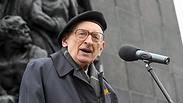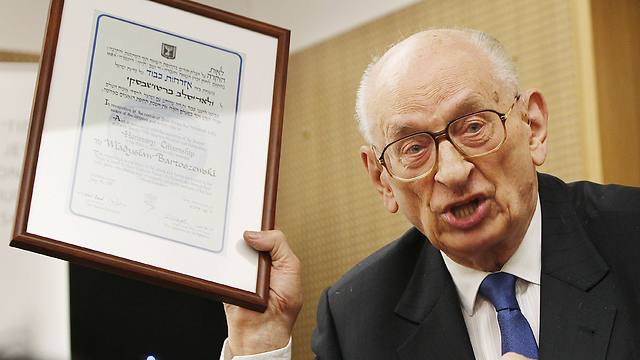
Bartoszewski speaking at 72nd anniversary of the Warsaw Ghetto Uprising
צילום: רויטרס
Former Polish foreign minister Bartoszewski dies at 93
Wladyslaw Bartoszewski was a prisoner at Auschwitz and a member of Poland's underground WWII resistance who helped Jews during the Holocaust.
WARSAW - Wladyslaw Bartoszewski, a former Auschwitz prisoner and member of Poland's underground World War II resistance who helped save Jews and later served twice as the country's foreign minister, died Friday in Warsaw. He was 93.
Bartoszewski died after being taken to a hospital in Warsaw on Friday afternoon. His death was confirmed by a number of leaders, including President Bronislaw Komorowski, who wrote on Twitter that he was deeply saddened.
"This is a huge loss; a great Pole has left us," Komorowski wrote.
Poland's former prime minister Donald Tusk, now EU Council president, said that Bartoszewski was "not to be substituted by anyone." In Tusk's government, Bartoszewski was deputy minister in charge of international dialogue, chiefly with Germany and Israel.
Parliament Speaker Radek Sikorski said flags at the parliament building would be lowered to half-staff in Bartoszewski's honor.
The Polish media also paid homage to him, remembering his achievements and some of his notable quotes, including: "It is worth being honest, though it doesn't always pay off. It pays off to be dishonest, but it isn't worth it."
Very much present in the public life, Bartoszewski was widely respected not only for his wartime resistance, but also as a historian, author of books on World War II history, social activist and politician. He spent a large part of his life working for Polish-German reconciliation, making it a focus of his writings and speeches in Poland and in Germany.
A Polish Catholic, Bartoszewski, was born in 1922 in Warsaw. The son of a bank clerk, he grew up next to Warsaw's Jewish district and had many Jewish friends.
When he was still just a teenager he fought in the defense of Warsaw against the Germans, who invaded the country in September 1939. Caught in a street roundup in Warsaw in 1940, he was sent to Auschwitz, which was first used by the Nazi Germans for Polish resistance fighters. There he was given the prison number 4427.
In a very rare occurrence, he was released in April 1941 thanks to the efforts of the Polish Red Cross, which he had worked for before his arrest.
Back in Warsaw, he wrote a detailed report from his time at the camp, the first known written witness account from Auschwitz. He also reported on Auschwitz to Poland's clandestine resistance Home Army, commanded from London by Poland's government-in-exile. He joined the resistance, the underground Home Army, and organized secret help to the prisoners of the Pawiak prison, where the Germans held and tortured Polish resistance members and ordinary people.
He also joined a resistance unit devoted to saving Jews, known as Zegota. For his efforts to help the Jews he was honored by the Yad Vashem, Israel's Holocaust memorial, as a "Righteous Among the Nations" in 1965. He was also an honorary citizen of Israel.
Before the war was over, however, he took up arms yet again against the Germans, fighting in the ill-fated Warsaw Uprising of 1944.
The war's end meant new hardship for Bartoszewski, who became the target of the new, imposed communist regime, which considered all Home Army independence fighters a threat, because they opposed the Soviet-backed communist rule. For his independent thinking and pro-democracy writings Bartoszewski was imprisoned - on fabricated espionage charges - and spent nearly seven years in prison before a court finally ruled in 1955 that he had been unfairly arrested. He found work as a lecturer at a Catholic university, and also wrote for Radio Free Europe and lectured in Germany.
In the 1980s he was active in Solidarity, the movement that eventually helped toppled communism, but that earned him some four months' confinement under martial law.
Bartoszewski was an animated and exhaustive speaker who had a lot to say on many issues. He met often with young people, hoping to encourage them to embrace peace and tolerance. He said he saw it as an obligation to bear testimony to the decades of cruelty he witnessed during the war and under communism.
He appeared active and charismatic until the end.
Just last Sunday Bartoszewski took a leading role at observances marking the 72nd anniversary of the Warsaw Ghetto Uprising, speaking with energy and at length to a group gathered to honor the fallen ghetto fighters.
Former President Aleksander Kwasniewski said Bartoszewski died in his own style.
"I heard on the radio today that he was taken to hospital, and right after that came the news that he had died. Very much like him: quickly, without bothering us with his situation. He has done his job here and has gone to the supreme authority," Kwasniewski said.
Bartoszewski is survived by his second wife Zofia, and son Wladyslaw, a historian.











